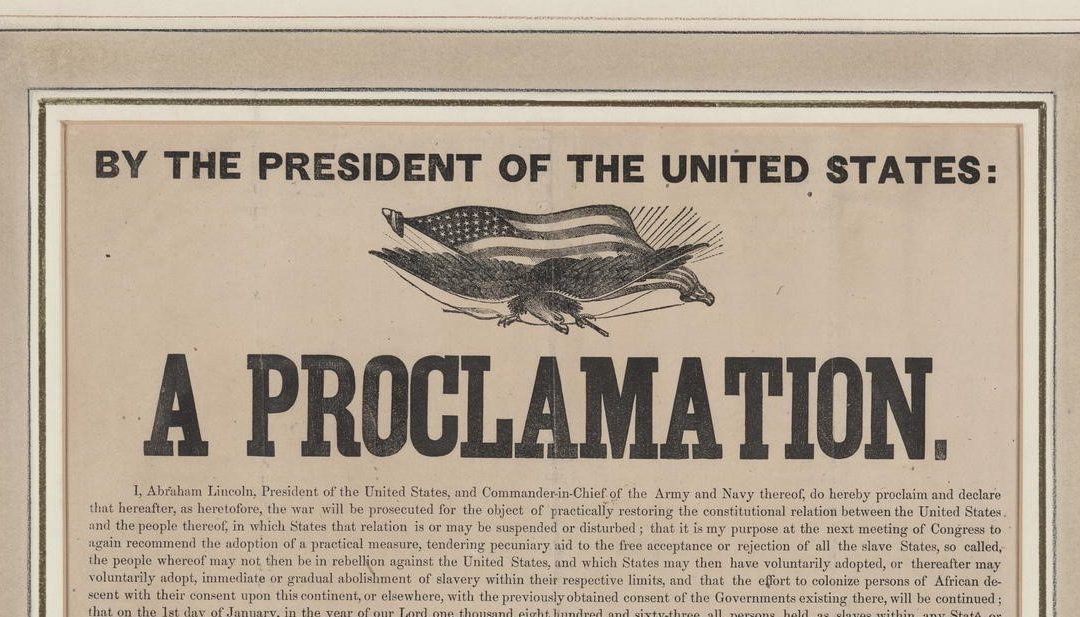Juneteenth — originating in 1865 — celebrates the day that the last enslaved African Americans were declared free. Although the Emancipation Proclamation took effect over two years prior on January 1, 1863, not all African Americans were immediately liberated. Those in Confederate territories continued to be enslaved. It was not until June 19, 1865, when 2,000 Union troops led by General Gordon Granger arrived in Galveston Bay, Texas, that the last enslaved African Americans were informed that they were free by executive decree.
In May of this year, Governor Jay Inslee officially declared Juneteenth an official, paid holiday for state employees in Washington. On Thursday, Biden established Juneteenth as a national holiday.
Although Juneteenth marks a momentous celebration of freedom and independence, the 200+ years of slavery and the Jim Crow era that followed continue to leave a legacy of structural racism. The timeline below synthesizes the key events leading up to and following Juneteenth. Specifically, it outlines major historical events from the Civil War to the present. While Juneteenth marked the end of slavery in the United States, the oppression of the Black community persisted in various forms.
CIVIL WAR (April 12, 1861 – April 9, 1865): In 1860, the election of Abraham Lincoln sparked the secession of eleven southern states, which formed the Confederate States of America. The Civil War was fought between northern and southern states largely over the issue of slavery. The war ended in 1865 with Confederate surrender.
- EMANCIPATION PROCLAMATION (January 1, 1863): President Lincoln’s Emancipation Proclamation ended the practice of slavery in rebellious states. (Slavery, however, would not be abolished at the national level until the ratification of the Thirteenth Amendment.)
RECONSTRUCTION (1865-1877): Reconstruction describes the post-emancipation period. During this time, formerly enslaved African Americans worked to reunite their families, build schools, and run for political office.
- JUNETEENTH (June 19, 1865): General Gordon Granger informed the last enslaved African Americans in Galveston Bay, Texas, that they were free by executive decree.
- THIRTEENTH AMENDMENT RATIFIED (December 6, 1865): The Thirteenth Amendment abolished slavery “within the United States, or any place subject to their jurisdiction.” Congress required former Confederate states to ratify the amendment in order to regain federal representation.
- FOURTEENTH AMENDMENT RATIFIED (July 9, 1868): The Fourteenth Amendment provided citizenship to all people “born or naturalized in the United States” and extended to citizens “equal protection under the laws.”
- FIFTEENTH AMENDMENT RATIFIED (February 3, 1870): The Fifteenth Amendment declared that states could not take away the right to vote “on account of race, color or previous condition of servitude.” This amendment empowered Black men to seek positions in political office. Over the following two decades, approximately 20 Black men served in U.S. Congress. However, the Black community’s participation in national politics sparked backlash from White supremacy groups, which retaliated with intimidation and violence.
JIM CROW ERA (1877-1950s): Southern lawmakers, realizing that they could not explicitly disenfranchise Black communities, found loopholes to the Fifteenth Amendment by imposing Jim Crow laws and voter qualifications that enforced racial segregation. These qualifications – which were instituted first in Mississippi before spreading to other Southern states – included literacy tests, grandfather clauses, and poll taxes, among others.
- TULSA RACE MASSACRE (May 31-June 1, 1921): Mobs of white residents attacked Black citizens and destroyed property in the Greenwood District in Tulsa, Oklahoma. At the time, the Greenwood District was an affluent Black community known as “Black Wall Street.” The attacks destroyed over 35 square blocks of the neighborhood. Reported deaths vary widely, with estimates ranging up to 300 deaths.
- 1934 NATIONAL HOUSING ACT (June 27, 1934): The National Housing Act established the Federal Housing Administration (FHA). The FHA furthered segregation by refusing to insure mortgages in and near African American neighborhoods (known as “redlining”). At the same time, the FHA subsidized the construction of neighborhoods for white communities and implemented requirements that prevented the homes from being sold to Black citizens.
VOTING RIGHTS ACT (August 6, 1965): President Lyndon B. Johnson signed into law the Voting Rights Act, which outlawed literacy tests and provided federal oversight of voter registration in areas where <50% of non-white people were registered to vote. This act was designed to prohibit racial discrimination in voting.
WAR ON DRUGS (1971 to present): In 1971, President Richard Nixon declared a “war on drugs.” He drastically increased the power of federal drug control agencies and implemented measures such as mandatory sentencing and no-knock warrants. In a 1994 interview, John Ehrlichman — Nixon’s domestic policy advisor — admitted that the “war on drugs” began as a racially motivated act focused on targeting Black communities and the anti-war left: “we knew we couldn’t make it illegal to be either against the war or blacks, but by getting the public to associate the hippies with marijuana and blacks with heroin and then criminalizing them both heavily, we could disrupt those communities.” This led to a spark in mass incarceration (a 700% growth in prison populations since 1970) which disproportionately affects Black communities (one out of three Black men are imprisoned in their lifetime, versus one out of seventeen white men).
SHELBY COUNTY V. HOLDER (June 25, 2013): The Supreme Court’s 5-4 ruling in Shelby County v. Holder struck down a key component of the Voting Rights Act by eliminating federal approval (known as preclearance) before local jurisdictions change their election laws. Subsequently, America witnessed an increase in restrictive voting laws in states such as Texas, Arizona, and Georgia.
PRESENT DAY ADVANCEMENTS (2020 elections): Stacey Abrams founded Fair Fight, a nonprofit promoting free and fair elections. During the 2020 elections, she helped register at least 800,000 new voters in Georgia, including those from underrepresented Black and brown communities.
PRESENT DAY DRAWBACKS:
- ATTACK ON THE U.S. CAPITOL (January 6, 2021): Former President Donald Trump made spurious claims that challenged the integrity of the November 2020 election results. Trump’s exhortation ultimately culminated in the January 6, 2021 attack on the U.S. Capitol, where rioters – bearing Confederate flags and other extremist symbols of White supremacy – stormed the U.S. Capitol in an attempt to overturn President Joe Biden’s victory.
- GEORGIA’S ANTI-VOTING RIGHTS BILL (SB202) SIGNED INTO LAW (March 25, 2021): Georgia Governor Brian Kemp (R) signed into law new voter identification requirements for absentee ballots, which curb the use of ballot drop boxes and enable state officials to take over local election boards, among other measures.
- FLORIDA’S ANTI-VOTING RIGHTS BILL (SB90) SIGNED INTO LAW (May 6, 2021): Florida Governor Ron DeSantis (R) signed into law stricter voter identification requirements for voting by mail. The new law limits who can pick up and return a voter’s ballot, among other measures.
Sources: CNN, USA Today, NBC News, NPR, Brennan Center, ACLU
Establishing Juneteenth as a national holiday provides an important acknowledgement of the oppression faced by Black Americans, and is the culmination of decades of advocacy by activists and leaders. Texas was the first state to establish Juneteenth as a holiday in 1980. In 1994, leaders from around the nation gathered in New Orleans to advocate for even greater acknowledgement of June 19th’s significance. Over 25 years later, Juneteenth was finally acknowledged as a national holiday.
While recognizing Juneteenth as a federal holiday is long overdue, more work needs to be done to break down the walls of structural racism. Congress and state governments remain divided on addressing real issues that perpetuate systemic racism:
- Several states (Arkansas, Idaho, Florida, and Oklahoma) currently ban the teaching of critical race theory, which examines the ways race intersects with politics, culture, and the law. Lawmakers in a dozen other states (Michigan, Tennessee, Texas, Georgia, North Carolina, South Carolina, Ohio, South Dakota, Arizona, Kentucky, Utah, and New Hampshire) are considering similar bans
- The Justice for Victims of Lynching Act of 2018, which would criminalize lynching, was never passed by the House
- The Senate remains divided on Black voting rights, especially relating to the John Lewis Voting Rights Advancement Act, a bill that aims to prevent states from carrying out racially discriminatory voting laws
In honor of Juneteenth, we encourage you to continue learning about the sources of structural racism in the United States. In next week’s blog post, we will dive further into the details of modern day systems of racism, with a focus on voter suppression and mass incarceration.
Sources:
- https://nmaahc.si.edu/blog-post/historical-legacy-juneteenth
- https://www.cnn.com/interactive/2021/05/politics/black-voting-rights-suppression-timeline/
- https://www.usatoday.com/story/news/2021/03/05/black-voting-rights-reconstruction-jim-crow/6919352002/
- https://www.cnn.com/2021/04/03/politics/state-legislation-voter-suppression/index.html
- https://www.journals.uchicago.edu/doi/pdf/10.1086/713922
- https://www.prisonpolicy.org/blog/2019/10/09/pretrial_race/
- https://theappeal.org/political-report/when-are-elections-for-prosecutor-and-sheriff/
- https://www.npr.org/2017/05/03/526655831/a-forgotten-history-of-how-the-u-s-government-segregated-america
- https://www.nbcnews.com/news/us-news/credited-boosting-democrats-georgia-stacey-abrams-looks-january-n1247281
- https://www.brennancenter.org/our-work/analysis-opinion/race-mass-incarceration-and-disastrous-war-drugs
- https://www.aclu.org/issues/smart-justice/mass-incarceration
- https://www.cnn.com/2021/06/16/us/juneteenth-federal-holiday-timeline-trnd/index.html
- https://www.newsweek.com/juneteenth-national-holiday-leaves-black-people-unimpressed-1601096
Image source: https://loc.getarchive.net/media/preliminary-emancipation-proclamation

